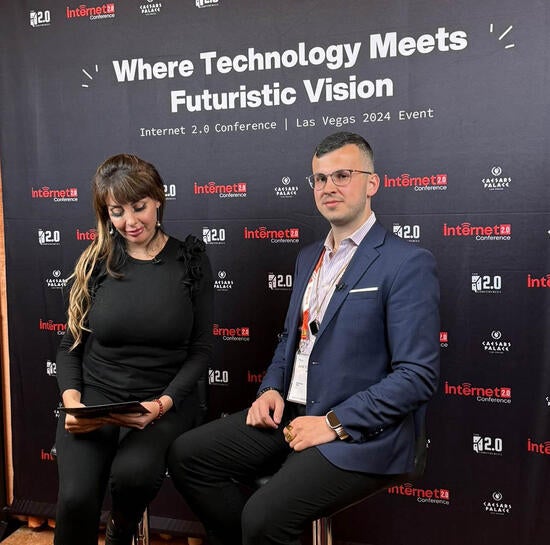
Have you ever wondered if a classroom lesson will be relevant in the real world? For Emil Shirokikh ’25 PMBA, a class project spurred the idea for a new AI startup, and a subsequent health crisis heightened his awareness of maximizing his time while bringing his business to fruition.
Last fall, Assistant Professor of Teaching in Information Systems Rich Yueh assigned students, including Shirokikh, to develop an idea for a technology startup. The deliverable was a business plan with cost estimates, defined employee roles, and a market analysis. At the time, artificial intelligence was on Shirokikh’s mind because the industry’s growing pains frequently appeared in the news and on social media. His startup idea would be form-filling AI software, thus tapping into the new and evolving technology to revamp an application that sorely needed an update.
At the same time, Shirokikh’s childhood friend, UCR undergraduate Carlos Langer, was writing his bachelor’s thesis on environmental, sustainability, and governance (ESG) reports, which summarize the environmental impact of a company’s operations. This topic was interesting for Langer because many of his friends are sustainable finance consultants who share a perplexing obstacle: locating reliable data when writing ESG reports. The consultants’ first challenge is the time-consuming process of contacting multiple sources to collect data. The second is the lack of a uniform reporting system among the stakeholders. By identifying a problem (locating and collecting data for ESG reports) and then building a solution (AI-powered data management and form-filling), a new tech startup was born.
The Will to Win
Over the past year, the “Belto” team, led by Shirokikh, has been prolific in generating product ideas. The company’s future is promising; however, early in its development, the startup was almost sidelined. In October 2023, Shirokikh and Langer were diagnosed with a tumor at age 24 and 25, respectively. “It was shocking news for both of us,” says Shirokikh. “It is scary, and honestly, what are the odds that both of us would develop a tumor at the same time?”
Shirokikh and Langer have since successfully recovered from surgery and emerged with a clear purpose. “It made us realize one thing very quickly: time matters. We only have so much time on Earth to make a difference,” says Shirokikh, who pushed aside his fears around the risks of entrepreneurship and focused on the opportunity to deliver a unique, quality product to the marketplace.
Addressing Inefficiencies
Contrary to public sentiment, AI does not eliminate the need for human participation. In reality, AI-powered software leads to better tools in the hands of humans, who can then make smarter business decisions.
Developing solutions for businesses has become easier for Belto staff as they become more comfortable redefining the way daily tasks are done. One of the uses of their AI-enhanced software is for managers who frequently draft reports, such as an ESG report, income statement, or balance sheet disclosure. Shirokikh defines the issue: “These businesses gather a lot of decentralized data, analyze it, and then use the gathered information to write a report. This is a multi-step process that involves valuable time. Belto ESG software is designed to integrate seamlessly and cost effectively into their environment, gather and analyze the data automatically, and draft a report within seconds.”
Fall Product Launch
Still in the initial stages of startup development, Belto has an ambitious plan for 2024. It is scheduled to complete the initial testing phase for its first viable products in summer 2024, with the software to be published by October 2024. The stakes are high as the team works diligently to complete the product development process. Shirokikh admits to closely managing company and product formations. “We are heavily invested in building our product lines, including designing and building a professional website and web app,” he says. “We even build our own hardware and run our app on Belto servers.”
Tech Industry Recognition
The company’s approach to fearlessly incorporating AI into business solutions recently caught the eye of industry insiders. Shirokikh and Belto were honored by The 2.0 Conferences, an organization that facilitates discussions and tech collaborations among innovators in fast-moving industries. Its Internet 2.0 tech conferences are a platform for introducing innovative products and rising talent. For his role in leading a team of technology and business specialists in developing AI-based applications, Shirokikh received the Young Leadership Award at the March 2024 Internet 2.0 Conference in Las Vegas. For Shirokikh and his team, the award verifies that Belto is on the right path.
Human Connections Are Key to AI Growth
Determined to keep momentum, Shirokikh has built a strong support base by networking on social media and at the Internet 2.0 conference. “I have met many executives, business owners, and venture capitalists. I have also found lots of encouragement from innovators at the conference and in the Los Angeles business community,” he says, adding that these connections believe in the viability of AI applications and have shared insights. “I feel confident that I can access funding to continue growing the business.”
> 60% of entrepreneurs believe that AI is the most promising innovative technology.
> Technology and health care startups are the strongest industries, bringing in the most revenue compared to other startup categories.
> The United States is the leading country by the number of startups, followed distantly by India.
> 95% of entrepreneurs that create startups have a bachelor’s degree, and 47% have more advanced degrees.
___________
Source: FounderJar; quoted from founderjar.com/startup-statistics

